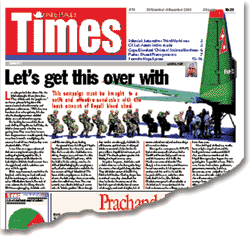 Exactly one year ago, on 25 November, the Maoists abruptly walked out of peace talks and broke a four-month truce to carry out a spectacularly devastating attack on the army barracks in Ghorahi in Dang.
Exactly one year ago, on 25 November, the Maoists abruptly walked out of peace talks and broke a four-month truce to carry out a spectacularly devastating attack on the army barracks in Ghorahi in Dang. The next day, King Gyanendra declared a state of national emergency, the government officially labelled Maoists as terrorists, and the army was deployed. That Friday, we carried a headline: "Let's get this over with". We said: "This campaign must be brought to a swift and effective conclusion with the least amount of Nepali blood shed." How na?ve we were.

More than 5,000 Nepalis (plus minus a thousand-no one seems to know for sure) have died in the past year. More than had died in the previous five years. With inadequate logistics, equipment and manpower, the army has been fighting a vicious guerrilla war against its own people in one of the most difficult terrains in the world. Aside from the headline-grabbing attacks on security bases, there is the daily death toll of the innocent. Village leaders, teachers, social and political activists mercilessly murdered throughout the country every day. If murder and mayhem is what the Maoist leaders wanted, they have got it.
In this space exactly a year ago, we said: "The emergency is not going to resolve the crisis. It depends how well we demonstrate that we have learnt the lessons about the past lapses that got us to this stage, and begin to correct them. Like.restoring the peoples' confidence that there is a government that cares about its people and not just about itself."
Now, we have no parliament, no local elected bodies, the prime minister has been sacked, there is a military stalemate and a political deadlock. But we do have a full council of ministers. Can this team of 22 ex-politicos, technocrats and relics from the Panchayat era deliver where an elected government failed? We desperately hope so.
The main parliamentary parties say their policy is one of "no confrontation and no surrender". How about a policy of unity? The forces of democracy have no choice but to get together. The extreme right and extreme left do not believe in democracy, the moderate centre that does must not be divided. But the signs are not good.
For the past month after he was appointed premier, Lokendra Bahadur Chand went house-to-house trying to persuade political leaders to join his cabinet. It didn't work. So, the king handpicked his own men (and one woman). It shows a geographical and ethnic mix that reflects Nepal's diversity. In normal times this should make up a good team, but these are not normal times. Not only are there Maoists at the gates, but there is a widening rift between the palace and the parties which will stymie efforts at service delivery.
The only people who benefit from this rift are the Maoists and the rightists. And, not surprisingly, both are trying their best to widen the gap. Nepalis are so muted by mindless violence and a sinking economy that they will go along with anyone who restores peace. Their disillusionment with the political parties is complete, and they will give the king and his council of ministers a chance. But the country's problems are so serious and solutions are required so urgently that the government has limited time to show it can deliver peace and development, in that order.
Everyone is waiting to see if the king can pull a rabbit out of the hat and announce a ceasefire. If that happens, the people will reward him with a peace dividend and that will translate into legitimacy for his ministers. The bad news is that there is really no reason at the moment for either side to talk. The Maoists are convinced their revolution is on track, and the government will only want to negotiate from a position of strength. The government wants to first intensify military pressure on the Maoists, for which it needs promised military hardware from abroad.
Everyone agrees there is no military solution to this crisis. Even the security forces say their objective is to force the Maoists to understand this. Having broken the truce once, it is up to the Maoists now to show that they are willing to negotiate in good faith. It would help if the international community and our neighbours leaned on them a little more.
One thing is certain: the nation can't take another year of this.


